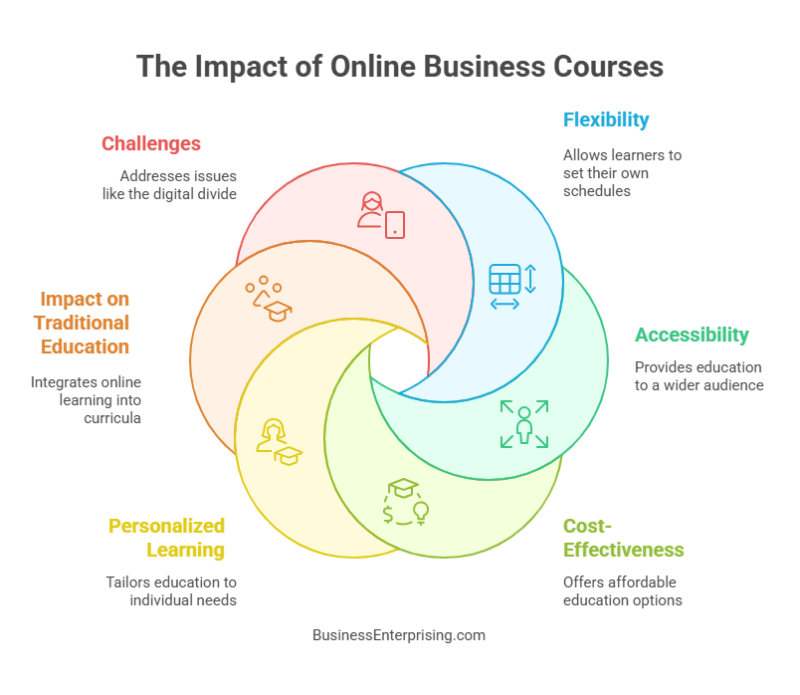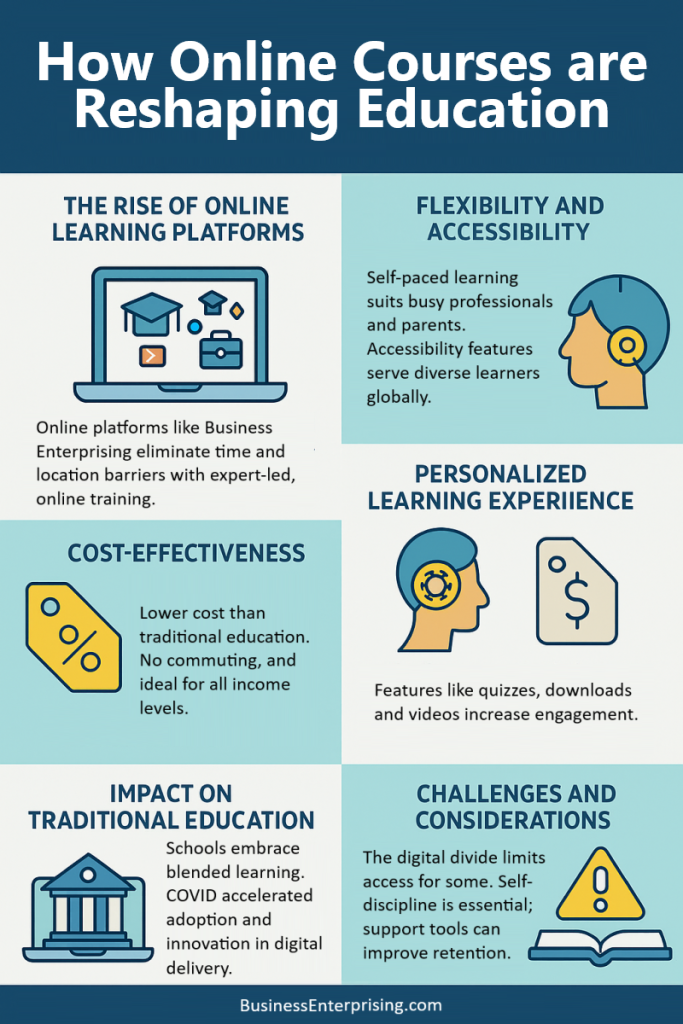 In the modern era, the way people learn and acquire new skills has been fundamentally transformed by the advent of online courses. As technology advances, traditional education methods are being supplemented and, in some cases, replaced by digital learning platforms. These platforms offer flexibility, accessibility, and a vast array of resources that cater to diverse learning needs. Let’s explore how online business courses are reshaping education, workplace training and how employees acquire new skills.
In the modern era, the way people learn and acquire new skills has been fundamentally transformed by the advent of online courses. As technology advances, traditional education methods are being supplemented and, in some cases, replaced by digital learning platforms. These platforms offer flexibility, accessibility, and a vast array of resources that cater to diverse learning needs. Let’s explore how online business courses are reshaping education, workplace training and how employees acquire new skills.
The Rise of Online Learning Platforms
Firstly, the proliferation of the internet and digital technologies has paved the way for the rise of online learning platforms. Websites like Coursera, Udemy, and Business Enterprising have become household names, providing courses on a multitude of subjects ranging from data science to creative writing. These platforms offer learners the opportunity to study at their own pace, from the comfort of their homes, breaking down geographical and temporal barriers that traditionally restricted access to education.
Moreover, online courses are often designed by industry experts and top educators, ensuring high-quality content. This access to expert knowledge is invaluable, especially in fields that are rapidly evolving. For instance, technology and business sectors frequently update their practices and methodologies. Consequently, online courses can quickly adapt to these changes, providing up-to-date information and training that is essential for staying competitive in the job market.
Flexibility and Accessibility
One of the most significant advantages of online courses is their flexibility. Unlike traditional classroom settings, online courses allow learners to set their own schedules. This flexibility is particularly beneficial for working professionals, parents, and individuals with busy lifestyles who might find it challenging to attend regular classes. By accommodating various schedules, online courses make it possible for more people to pursue education and skill development.
Additionally, online courses often come with various accessibility features that enhance the learning experience. For example, video lectures can include subtitles for hearing-impaired individuals, and downloadable materials can be formatted for screen readers, aiding those with visual impairments. Furthermore, many online platforms offer courses in multiple languages, broadening the reach to non-native speakers. This inclusive approach ensures that education is accessible to a wider audience.
Cost-Effectiveness
Another notable benefit of online business courses is their cost-effectiveness. Traditional education, particularly at the higher education level, can be prohibitively expensive for many. Tuition fees, accommodation, and other associated costs can deter individuals from pursuing further education. Conversely, online courses are often significantly cheaper and sometimes even free. This affordability allows individuals from various socioeconomic backgrounds to enhance their skills and knowledge without incurring substantial debt.
In addition to the lower cost, online courses eliminate the need for commuting, thereby saving time and money. Learners can access course materials from anywhere with an internet connection, making education more convenient and less financially burdensome. This democratization of education through online courses is a crucial step towards creating a more educated and skilled global population.
Personalized Learning Experience
Moreover, online courses offer a personalized learning experience that is often lacking in traditional educational settings. Many online platforms use algorithms to recommend courses based on a learner’s interests, past courses, and career goals. This personalized approach helps learners focus on areas that are most relevant to their needs and aspirations.
Furthermore, online courses often include interactive elements such as quizzes, discussion forums, and peer reviews. These features engage learners actively, promoting better retention and understanding of the material. Additionally, the ability to revisit lectures and course materials allows learners to review complex topics at their own pace, reinforcing their learning.
Impact on Traditional Education
The impact of online courses extends beyond individual learners to traditional educational institutions. Many universities and colleges have recognized the value of online learning and have integrated online courses into their curricula. Blended learning models, which combine online and face-to-face instruction, are becoming increasingly popular. These models provide the best of both worlds: the flexibility of online learning and the personal interaction of traditional classrooms.
Moreover, the COVID-19 pandemic has accelerated the adoption of online education. As schools and universities closed their physical campuses, online learning became the primary mode of instruction. This shift highlighted the potential of digital education and prompted many institutions to invest in improving their online offerings. While the pandemic posed significant challenges, it also catalyzed innovation in educational delivery methods.
Challenges and Considerations
However, despite the numerous benefits, online courses are not without challenges. One of the primary concerns is the digital divide. Not everyone has access to reliable internet or the necessary technology to participate in online learning. This disparity can exacerbate existing educational inequalities. To address this issue, governments and organizations must invest in infrastructure and provide support to ensure equitable access to digital education.
Additionally, online courses require a high degree of self-discipline and motivation. Without the structure of a traditional classroom, some learners may struggle to stay on track. To mitigate this, online platforms are incorporating features such as progress tracking, reminders, and support communities to help learners stay engaged and motivated.
Conclusion
In conclusion, online business courses have revolutionized the way people learn and acquire new skills. Their flexibility, accessibility, cost-effectiveness, and personalized learning experiences make them a powerful tool for education and professional development. While challenges such as the digital divide and the need for self-discipline remain, the benefits of online courses far outweigh these obstacles. As technology continues to evolve, the potential for online learning to enhance education and skill acquisition will only grow, making it an indispensable component of the modern educational landscape.


